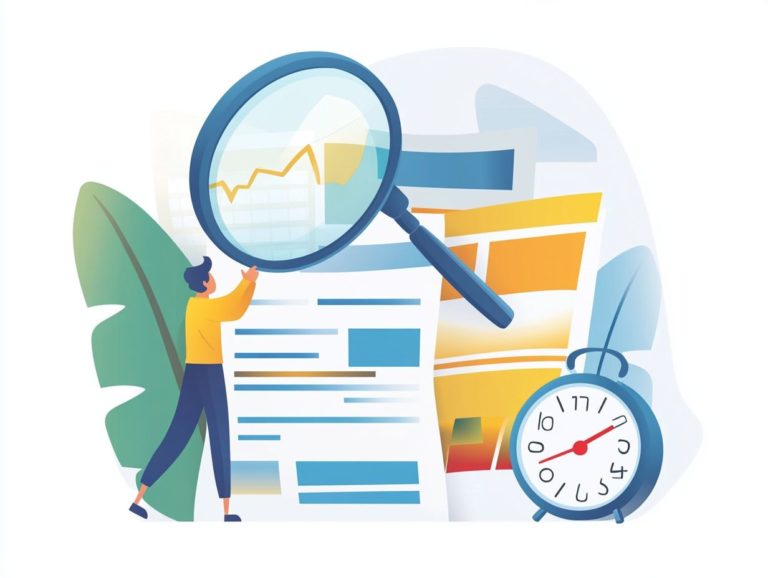Tips for Educating Yourself on Credit Scores
Understanding your credit score is crucial don t miss out on financial opportunities! This guide distills the essentials what a credit score is, why it’s indispensable for your financial well-being, and the key factors that affect it.
It also delves into how to check and monitor your score, offering practical tips to enhance it. Whether you’re embarking on your financial journey or looking to refine your credit profile, this guide provides the insights you need to thrive.
Contents
- Key Takeaways:
- Understanding Credit Scores
- Factors that Affect Credit Scores
- How to Check and Monitor Your Credit Score
- Improving Your Credit Score
- Frequently Asked Questions
- What are credit scores and why is it important to educate myself about them?
- What are some tips for maintaining a good credit score?
- How can I improve my credit score if it is low?
- Are there any resources available to help me educate myself on credit scores?
- Is it possible to have a perfect credit score?
- How often should I check my credit score?
Key Takeaways:

- Understanding your credit score is crucial for financial health. It is a numerical representation of your creditworthiness and determines your ability to obtain credit.
- Factors like payment history, credit utilization, and the length of your credit history can significantly impact your credit score. Stay on top of these to maintain a healthy score.
- Regularly checking and monitoring your credit score can help you identify errors and fraudulent activity. Take advantage of free credit reports and utilize credit monitoring services for added protection.
Understanding Credit Scores
Understanding credit scores is crucial for making informed financial decisions, as they significantly impact your eligibility for loans, credit cards, and even rental agreements.
A credit score is your numerical representation of creditworthiness, typically ranging from 300 to 850. The higher your score, the better your credit health.
It is influenced significantly by factors such as payment history and credit utilization.
This essential metric is pulled from your credit report, which outlines your borrowing and repayment behavior over time. Payment history makes up about 35% of your score, showcasing your reliability in making timely payments on loans and credit accounts.
Meanwhile, credit utilization accounts for roughly 30%, reflecting how much of your available credit you re using compared to your total credit limit.
Understanding these components is vital, as they directly impact your FICO score, the most commonly used credit scoring model. Your score can affect everything from loan approvals to interest rates and even your chances of securing rental agreements or job opportunities.
What is a Credit Score?
A credit score is your numerical representation of creditworthiness, typically ranging from 300 to 850. The higher your score, the better your credit health.
Your FICO score is one of the most recognized credit scoring models and directly influences the interest rates on loans and credit products.
This essential metric is pulled from your credit report, which outlines your borrowing and repayment behavior over time. Payment history makes up about 35% of your score, showcasing your reliability in making timely payments on loans and credit accounts.
Meanwhile, credit utilization accounts for roughly 30%, reflecting how much of your available credit you re using compared to your total credit limit.
Understanding these components is vital, as they directly impact your FICO score, the most commonly used credit scoring model. Your score can affect everything from loan approvals to interest rates and even your chances of securing rental agreements or job opportunities.
Why is it Important?
Having a good credit score is essential for you to secure favorable interest rates on loans and credit cards. This allows you to save money over time and make informed financial decisions that enhance your overall financial wellness.
This positive financial standing not only boosts your chances of loan approval but also increases how much you can borrow, paving the way for opportunities like home ownership and car purchases.
On the flip side, if your score is lower, you might encounter higher interest rates, which can limit your financial options and weigh you down with additional costs.
In today s digital landscape, the threat of identity theft is ever-present, with personal information easily compromised, potentially wreaking havoc on your credit score. This is why fostering financial literacy is so crucial; it gives you the power to grasp credit management, recognize the significance of protecting your personal information, and maintain a strong credit profile.
Factors that Affect Credit Scores
Your credit score is shaped by several key factors, including your payment history, credit utilization, length of credit history, and recent credit inquiries. Each of these elements plays a vital role in how lenders and credit agencies evaluate your financial behavior, ultimately influencing their decisions regarding your creditworthiness.
Understanding these components gives you the power to manage your credit more effectively.
Start taking charge of your credit score today. Knowledge is power!
Payment History

Your payment history is crucial for your credit score. It shows how reliable you are in repaying loans and managing credit cards on time.
A strong payment history helps you secure better loan conditions. Late or missed payments can hurt your credit profile, making it harder to qualify for credit cards or mortgages.
Set up reminders or automate payments to ensure you pay on time. Review your monthly statements to catch mistakes early. Staying organized will help protect your financial well-being.
Credit Utilization
Credit utilization is the ratio of your credit card balances to your total credit limits. Keeping this ratio low is vital for a good credit score it reflects your responsible management of credit.
Keep your credit utilization below 30% for the best results. A lower utilization rate shows lenders that you manage your credit well, leading to better conditions when applying for new credit.
To achieve this, pay down your existing balances more frequently instead of waiting until the end of the billing cycle. You can also ask for higher credit limits to help lower your utilization rate, as long as you control your spending.
Understanding these concepts enhances your financial literacy, which is essential for long-term stability and success.
Why Your Credit History Matters
The length of your credit history significantly impacts your credit score, showcasing your experience in managing credit over time. Generally, lenders view longer histories favorably.
Lenders look at the age of each account when assessing your credit report. Older accounts suggest reliability and a solid track record. This extended period of managing credit gives you more chances to demonstrate responsible behavior, like making timely payments.
Older accounts also influence the average age of your credit accounts, a key factor in scoring models. Therefore, keep older credit lines active, even if they are rarely used, to positively impact your creditworthiness.
New Credit and Credit Inquiries
New credit accounts and inquiries can significantly influence your credit score. Lenders may see multiple recent inquiries as signs of potential financial distress, which could jeopardize your ability to secure loans or credit cards.
Every time you apply for credit, a hard inquiry appears on your report, lasting for a couple of years. This can be harmful if you plan to make major purchases, like a home or a car, as a lower score may lead to higher interest rates.
To navigate new credit wisely, space out your applications and seek new accounts only when necessary. Maintain your existing accounts in good standing and monitor your credit to mitigate any negative impacts.
By adopting sound financial habits, you can protect your credit score while accessing the credit you need.
How to Check and Monitor Your Credit Score
Regularly checking and monitoring your credit score is essential for maintaining your financial health. Ensuring your credit report is accurate can help you avoid errors that adversely affect your creditworthiness.
Keeping a close eye on your credit status gives you the power to make informed choices and safeguard your financial future.
Free Credit Reports and Scores

You are entitled to one complimentary credit report each year from each of the major credit agencies Equifax, TransUnion, and Experian. This means you can effortlessly review your credit score without spending a dime.
This opportunity keeps you informed about your credit history and helps you spot any potential inaccuracies or fraudulent activities that could jeopardize your financial well-being. Don t wait! Regularly review your reports to stay on top of your credit health.
When you check your credit report, be sure to assess important components such as payment history, how much credit you’re using compared to your limits, and any negative marks with great care. Understanding these elements can lead to better credit management and an improved score over time.
Credit Monitoring Services
Credit monitoring services give you a proactive edge in tracking your credit score. They alert you to any significant changes or potential identity theft, enhancing your overall financial savvy.
These services keep you updated with regular insights on your credit reports. You’ll grasp the factors impacting your scores with greater clarity. By receiving timely alerts about new accounts, hard inquiries, or any suspicious activities, you can swiftly take action to address potential issues.
Early detection of discrepancies is crucial. It allows for quicker resolutions and helps prevent long-term damage to your credit history. Many credit monitoring services also offer personalized tips and resources, giving you the power to make informed financial decisions and improve your credit health over time.
Improving Your Credit Score
You can boost your credit score! Use these effective strategies. Pay your bills on time, manage your credit utilization wisely, and routinely review your credit report to identify any errors that could impact your credit history.
By taking these proactive steps, you position yourself for financial success.
Tips for Building Credit
Building credit is a gradual journey that hinges on your ability to make responsible financial choices. This means using your credit card wisely, maintaining low credit utilization, and making timely payments to establish a solid credit score.
Regularly monitor your credit reports to track your progress and ensure accuracy, as even minor mistakes can adversely affect your score. Setting up automatic payments can help you avoid missed deadlines, while paying a little above the minimum due can further enhance your creditworthiness.
Keep your credit card balances below 30% of their limits; this significantly boosts your credit utilization ratios. Over time, these habits not only elevate your credit score but also open the door to more favorable loan terms and interest rates in the future.
Strategies for Raising Your Score
Implementing effective strategies to elevate your credit score involves enhancing your payment history, managing credit utilization wisely, and correcting any inaccuracies in your credit report that could impede your access to loans.
These steps are crucial. They help improve your creditworthiness and unlock better loan terms. Paying your bills on time consistently sends a clear message of reliability, while maintaining your credit utilization below 30% demonstrates responsible borrowing habits.
Regularly reviewing your credit reports allows you to spot and fix errors, which can lead to rapid score improvements. Exploring options like secured credit cards or becoming an authorized user on a responsible person’s account can further pave the way for enhancement.
Each step you take not only fortifies your financial foundation but also plays a significant role in securing long-term economic stability.
Frequently Asked Questions

What are credit scores and why is it important to educate myself about them?
Credit scores are numbers that show how likely you are to repay debts. Knowing about credit scores helps you secure loans, credit cards, and even jobs.
What are some tips for maintaining a good credit score?
Pay your bills on time and keep credit card balances low. Avoid opening multiple credit accounts at once.
Regularly check your credit report for errors or signs of fraud.
How can I improve my credit score if it is low?
To improve a low credit score, pay off outstanding debts and dispute errors on your credit report. Keeping a low credit card balance is also key.
Consider working with a financial advisor for extra support on your journey to a better credit score!
Are there any resources available to help me educate myself on credit scores?
Yes! Visit the websites of credit bureaus like Experian, TransUnion, and Equifax for helpful tools. Many reputable financial websites also offer valuable insights and tips on credit scores.
Is it possible to have a perfect credit score?
Having a perfect credit score is highly unlikely but not impossible. Focus on maintaining a good score instead of aiming for perfection.
How often should I check my credit score?
Check your credit score at least once a year for free through the three major credit bureaus. If you re improving your score or suspect fraud, check it more often.
Don’t wait! Start monitoring your score today to protect your financial future.






